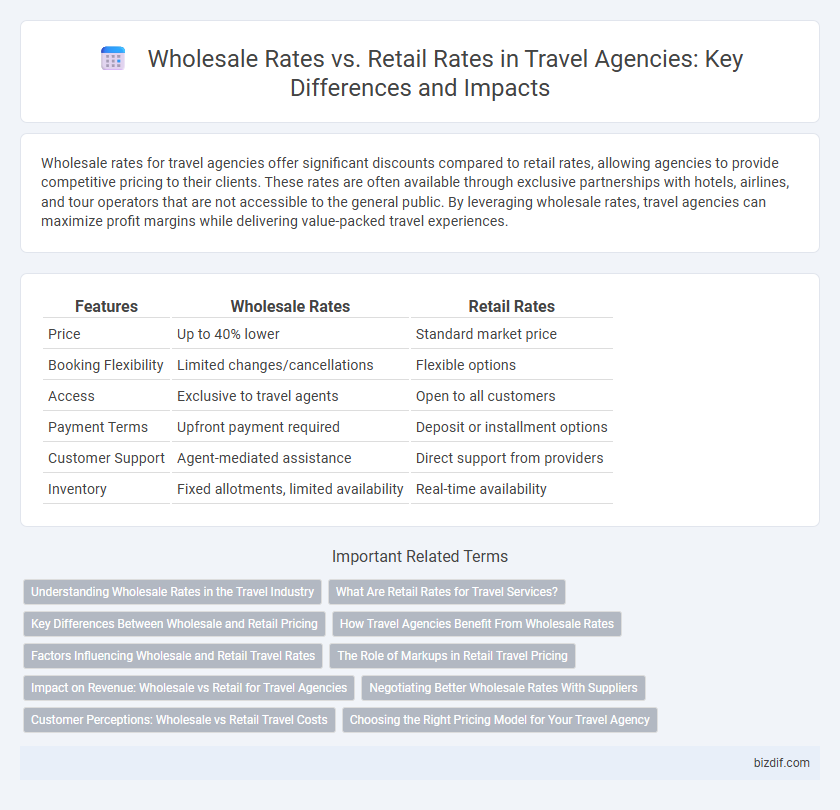Wholesale rates for travel agencies offer significant discounts compared to retail rates, allowing agencies to provide competitive pricing to their clients. These rates are often available through exclusive partnerships with hotels, airlines, and tour operators that are not accessible to the general public. By leveraging wholesale rates, travel agencies can maximize profit margins while delivering value-packed travel experiences.
Table of Comparison
| Features | Wholesale Rates | Retail Rates |
|---|---|---|
| Price | Up to 40% lower | Standard market price |
| Booking Flexibility | Limited changes/cancellations | Flexible options |
| Access | Exclusive to travel agents | Open to all customers |
| Payment Terms | Upfront payment required | Deposit or installment options |
| Customer Support | Agent-mediated assistance | Direct support from providers |
| Inventory | Fixed allotments, limited availability | Real-time availability |
Understanding Wholesale Rates in the Travel Industry
Wholesale rates in the travel industry refer to discounted prices that travel agencies secure by purchasing large volumes of services like hotel rooms, airline tickets, and tours directly from suppliers. These rates allow agencies to offer competitive prices to consumers while maintaining a profit margin, often resulting in savings compared to standard retail rates available to the general public. Understanding wholesale rates is essential for travel agencies to optimize pricing strategies and deliver value-driven packages that meet customer demands.
What Are Retail Rates for Travel Services?
Retail rates for travel services represent the final price paid by consumers, including markups from wholesalers or direct suppliers. These rates encompass transportation, accommodation, tours, and other travel-related services, often bundled or sold individually through travel agencies or online platforms. Understanding retail rates helps travelers compare costs and evaluate value against wholesale rates offered to agents or bulk buyers.
Key Differences Between Wholesale and Retail Pricing
Wholesale rates in the travel industry offer significantly lower prices compared to retail rates because they involve bulk purchasing from airlines, hotels, and tour operators, allowing travel agencies to access discounted deals. Retail rates are the prices customers pay directly, incorporating a markup that covers the agency's profit margin and operational costs. Understanding the key difference between wholesale and retail pricing helps travelers identify the best value options and empowers agencies to offer competitive packages by leveraging volume discounts.
How Travel Agencies Benefit From Wholesale Rates
Travel agencies benefit from wholesale rates by accessing significantly lower prices on flights, hotels, and tour packages, enabling them to offer competitive deals to clients while maintaining healthy profit margins. These preferential rates allow agencies to customize travel solutions and attract more customers through exclusive offers unavailable to the general public. Leveraging wholesale pricing improves operational flexibility and enhances the agency's ability to scale business efficiently in a competitive travel market.
Factors Influencing Wholesale and Retail Travel Rates
Wholesale travel rates are typically lower due to bulk purchasing agreements between travel agencies and service providers, allowing agencies to offer competitive prices by securing discounted room blocks, group flight bookings, and exclusive package deals. Retail travel rates are influenced by factors such as market demand, seasonal fluctuations, individual booking preferences, and agency markups to cover operational costs and generate profit. Supplier relationships, booking lead times, and flexibility in cancellation policies also significantly impact the pricing structures of both wholesale and retail travel rates.
The Role of Markups in Retail Travel Pricing
Retail travel pricing includes markups added to wholesale rates to cover operational costs and generate profit for travel agencies. Wholesale rates are typically lower because they are negotiated directly with suppliers, such as airlines, hotels, and tour operators, allowing agencies to offer competitive packages. The markup percentage varies based on service type, market demand, and agency overhead, directly influencing the final price paid by consumers.
Impact on Revenue: Wholesale vs Retail for Travel Agencies
Wholesale rates offer travel agencies the advantage of lower costs, enabling higher volume sales and larger profit margins per booking compared to retail rates. Retail rates, while higher, attract individual customers willing to pay a premium for tailored services, generating steady revenue streams but lower overall transaction volumes. Balancing wholesale and retail pricing strategies allows agencies to maximize revenue by tapping into diverse customer segments and optimizing profit margins.
Negotiating Better Wholesale Rates With Suppliers
Negotiating better wholesale rates with suppliers involves leveraging volume commitments and long-term partnerships to secure lower prices than standard retail rates. Travel agencies can increase their bargaining power by consolidating demand, demonstrating consistent booking patterns, and providing exclusivity agreements. Access to these discounted wholesale rates enables agencies to offer competitive packages that improve profit margins while attracting price-sensitive customers.
Customer Perceptions: Wholesale vs Retail Travel Costs
Customers often perceive wholesale travel rates as significantly more affordable than retail prices, associating them with exclusive deals typically accessible through travel agencies or group bookings. Retail rates are viewed as standard pricing directly posted by service providers, which can seem less flexible and higher in cost compared to wholesale options. The perception of value is influenced by the transparency of pricing, with wholesale rates appealing to budget-conscious travelers seeking competitive discounts without sacrificing quality.
Choosing the Right Pricing Model for Your Travel Agency
Wholesale rates offer travel agencies access to discounted prices from suppliers, enabling competitive pricing and higher profit margins. Retail rates represent the standard prices charged directly to customers, often resulting in less flexibility for agencies to adjust profits. Selecting the right pricing model depends on your agency's target market, volume of bookings, and the balance between margin control and client acquisition strategies.
Wholesale rates vs Retail rates Infographic

 bizdif.com
bizdif.com